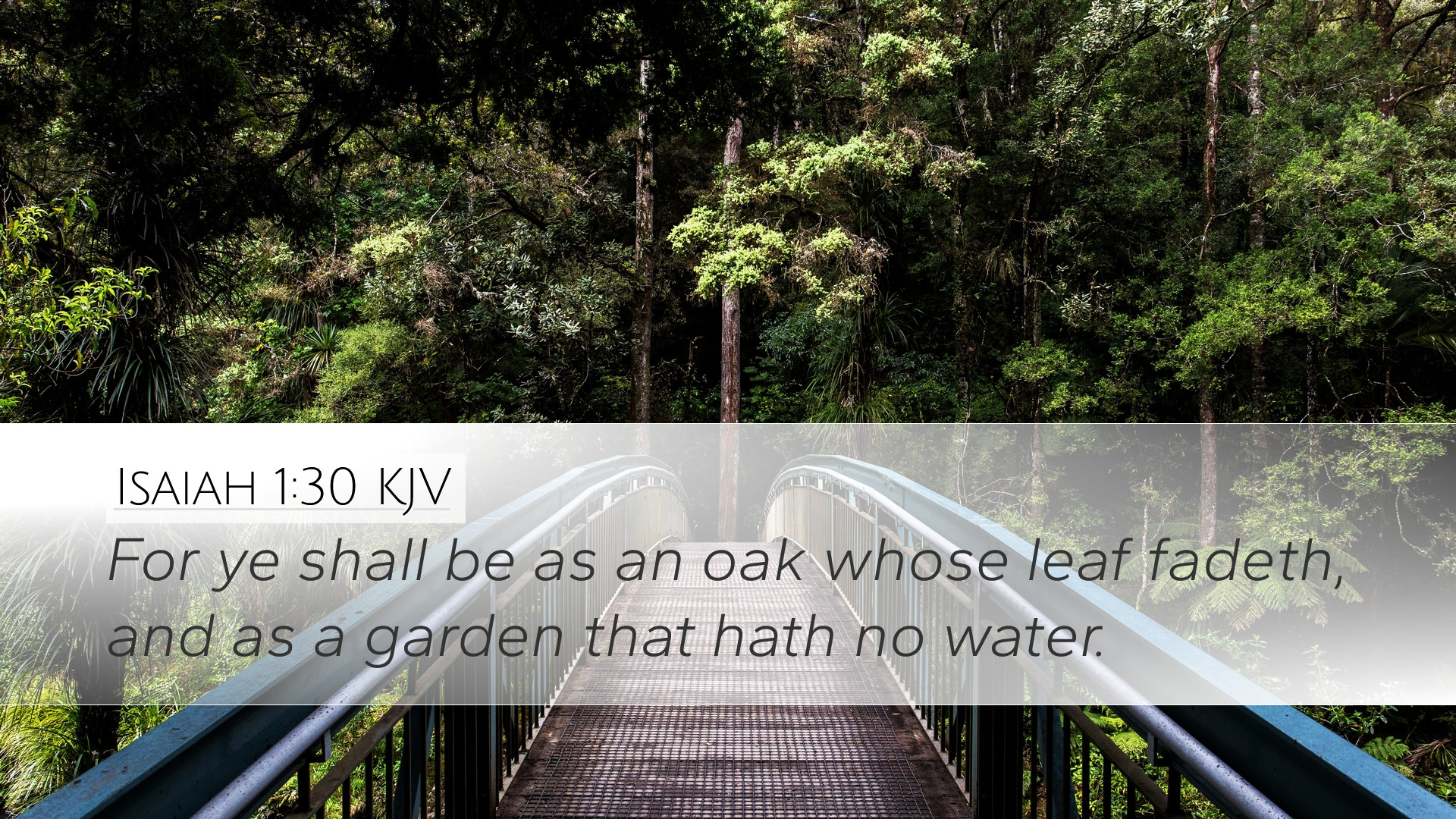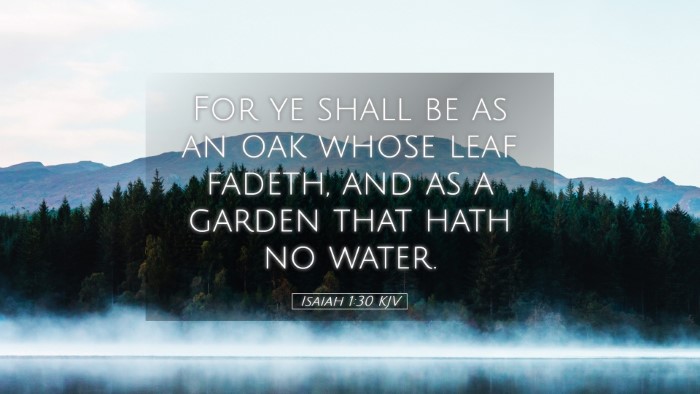Commentary on Isaiah 1:30
"For ye shall be as an oak whose leaf fadeth, and as a garden that hath no water."
Introduction
This verse is part of a larger prophetic message delivered by Isaiah, emphasizing Israel's spiritual decline and impending judgment. The imagery employed here reflects both the consequence of rebellion against God and the resultant desolation that follows spiritual drought.
Contextual Background
The Book of Isaiah addresses various aspects of the relationship between God and His people. In this opening chapter, Isaiah confronts Israel's moral decay and apostasy. The metaphor of the fading oak and the waterless garden captures the essence of Israel's condition, illustrating their failure to thrive spiritually due to their disobedience.
Insights from Commentaries
Matthew Henry's Commentary
Matthew Henry reflects on the imagery of a fading oak, which symbolizes strength and stability in a normal setting. However, when they are devoid of nourishment—like spiritual sustenance from God—they wither. Henry emphasizes that this serves as a solemn warning for the people of Israel; they are to recognize that without proper spiritual feeding through obedience and worship, they will become weak and dry.
- The oak as a symbol of strength: Henry points out that an oak tree is usually a symbol of permanence and strength, yet here it signifies decay—a direct warning about the people’s spiritual state.
- The garden without water: The garden represents beauty and life, yet a lack of water signifies judgment and barrenness—a metaphor for Israel’s spiritual lifelessness.
Albert Barnes' Commentary
Albert Barnes expands on the metaphor of the "leaf fadeth" and identifies it with the transient nature of prosperity and vitality when disconnected from God. He explains that the fading and the lack of water underscore the theological principle that spiritual life is contingent upon a relationship with God. Barnes poignantly articulates that spiritual dry spells occur when the people stray from worship and adherence to divine commandments.
- Failure of Israel: Barnes states that this condition—the fading leaf and unwatered garden—brought upon themselves; their sins have caused the withholding of divine favor and life.
- Significance of water: Water is a biblical symbol of the Holy Spirit and divine truth; without it, life diminishes. The absence of water signifies the withdrawal of God's presence and blessing, leading to inevitable decay.
Adam Clarke's Commentary
Adam Clarke offers a rich theological interpretation of this verse. He elucidates how the imagery reflects broader themes of divine judgment and the conditions for restoration. Clarke emphasizes that the fading of the oak's leaves highlights the existential threat faced by the people of Judah. He notes that any semblance of vitality they claim is temporal and will not suffice in the face of divine retribution.
- Spiritual bareness: Clarke argues that just as a garden cannot flourish without water, believers cannot thrive without God. His commentary suggests the need for repentance and return to faithfulness for renewal and purification of the soul.
- Hope amidst judgment: While the passage highlights their grim situation, Clarke points out that Isaiah continues with the message of potential restoration if the people turn back to God. This exists as a testament to God's mercy, even in the face of judgment.
Theological Implications
This verse serves as a profound illustration of the consequences of distancing oneself from God. It reinforces several key theological themes:
- The Necessity of Spiritual Nourishment: Just like vegetation relies on water for survival, believers must seek sustenance from God through prayer, study of the Word, and communal worship.
- Judgment as a Result of Disobedience: The imagery used by Isaiah conveys that failure to obey God's commands leads to spiritual barrenness and desolation.
- Call to Repentance: The distress represented allows for a redemptive possibility; God’s desire is always for His people to return to Him, indicating that judgment is not the endpoint but a clarion call to restore relationship.
Application for Today
For modern believers, this verse underscores the critical importance of remaining connected to God. As pastors, students, theologians, and scholars reflect upon this passage, they are reminded of several applications:
- Examine Personal Spiritual Health: Just as the oak and garden are metaphors for spiritual states, individuals are invited to evaluate their own spiritual health. Are we experiencing the vitality that comes from a life lived in obedience to God?
- Community Responsibility: Church leaders and congregations should consider how to foster environments that promote spiritual growth, ensuring that the ‘water’ of spiritual teachings and practices is readily available to all.
- Embrace Divine Mercy: The symbolism of fading foliage and wilting plants should inspire a profound longing for revival and a recognition that God’s mercy is as vital as ever. We are called to share this mercy with others, inviting them back to the life-giving relationship with God.
Conclusion
Isaiah 1:30 presents a poignant warning about spiritual decline through vivid imagery. It invites us into reflection on the state of our spiritual lives and the consequences of disconnection from God. Commentators like Matthew Henry, Albert Barnes, and Adam Clarke provide timeless insights that not only illuminate the text but also invite a deep engagement with its implications for both personal faith and communal practice. As we heed these warnings and call to restoration, may we grow in our faith and ensure that we remain ever nourished by the life-giving waters of God’s presence.


